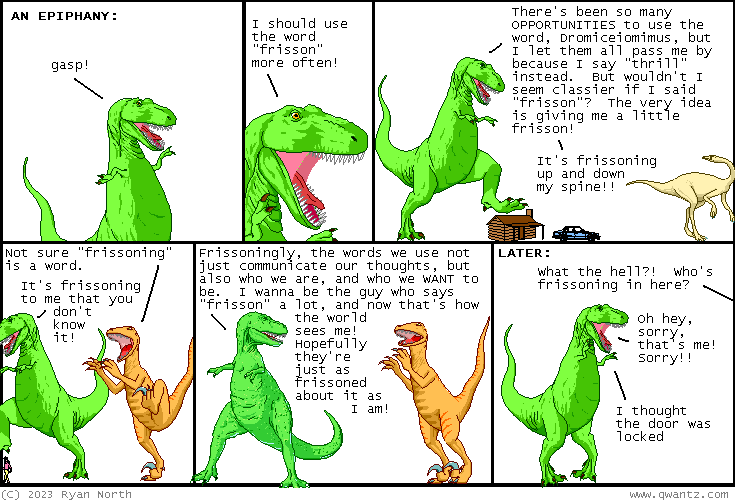Thrilling linguistics?
« previous post | next post »
A recent linguistic message from Dinosaur Comics:

The first five panels have a clear socio- and psycholinguistic message:
T-Rex: Gasp! I should use the word "frisson" more often! There's been so many OPPORTUNITIES to use the word, Dromiceiomimus, but I let them all pass me by because I say "thrill" instead. But wouldn't I seem classier if I said "frisson"? The very idea is giving me a little frisson!
T-Rex: It's frissoning up and down my spine!
Dromiceiomimus: Not sure "frissoning" is a word.
T-Rex: It's frissoning to me that you don't know it!
T-Rex: Frissoningly, the words we use not just communicate our thoughts, but also who we are, and who we WANT to be. I wanna be the guy who says "Frisson" a lot, and now that's how the world sees me! Hopefully they're just as frissoned about it as I am!
For more on this aspect of word choice, see "Purchase wine, buy beer", 10/19/2020.
Of course, linguistic register choice has the same contextual variation as other kinds of stylistic choice. Wearing a t-shirt over a bathing suit at a pool party is expected and therefore communicates very little, but wearing the same outfit in a more formal setting is different.
The history of these words is also linguistically interesting.
The etymology of thrill involves both semantic and phonological changes:
From Old English þȳrlian (“to pierce”), derived from þȳrel (“hole”) (archaic English thirl).
So the meaning has drifted from "hole" and "pierce" to "sudden wave of positive emotion" — and the sound has undergone metathesis of the vowel and the (originally following) /r/.
The word frisson is of course borrowed from French, wherefore the elitist vibe that attracts T-Rex. It comes from Latin frigēre "to be cold", and in French it still retains the sense of "shiver (with cold or fear)" as well as the figurative extension to "thrill (of excitement or nerves)".
And then there's the question of pronunciation. Merriam-Webster's entry for frisson uses a clearly French version, with a final nasalized vowel not yet assimilated into English pronunciation norms (as we've done with borrowings like abandon, baton, etc. ):
The choice between a French pronunciation and an anglified one adds another layer of self-presentation…
Keith Ivey said,
April 2, 2023 @ 12:00 pm
And þȳrel (hole) also gives us nostril.
KevinM said,
April 2, 2023 @ 5:35 pm
"Cut", by Sylvia Plath, appears to revive the historical meaning:
What a thrill –
My thumb instead of an onion.
Viseguy said,
April 2, 2023 @ 6:07 pm
Oh, but an "anglified" pronunciation would take the frisson out of frissoning. (I was tempted to weave in "by parody of frissoning", but restrained myself.)
Barbara Phillips Long said,
April 4, 2023 @ 3:18 am
Apparently T-Rex only recently started reading romance novels. When I first started noticing "frisson" it was pretty much always italicized. Sometime — in maybe the last twenty years? — the italics became much less frequent.